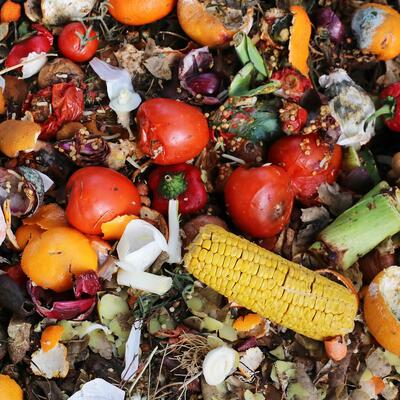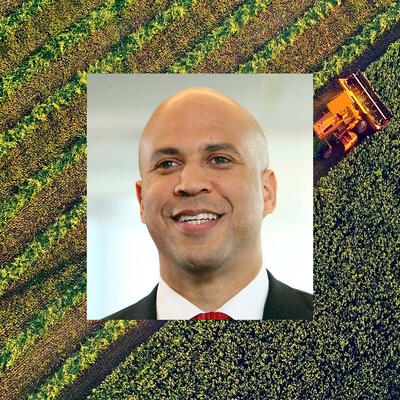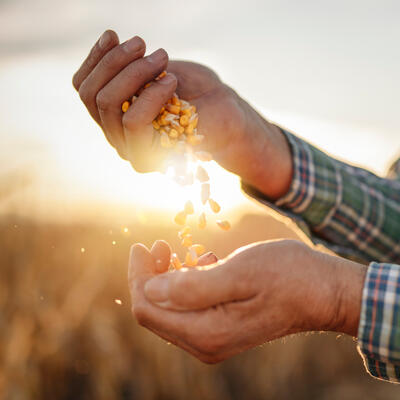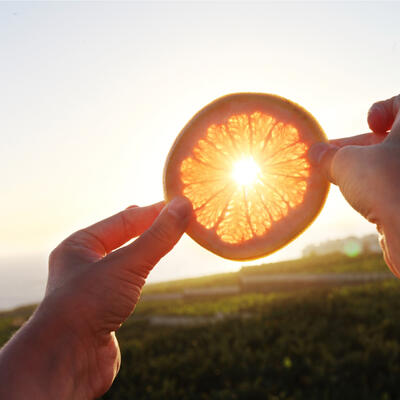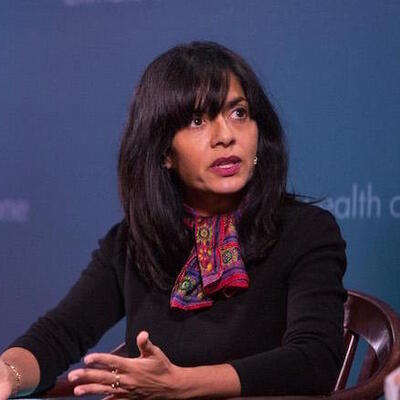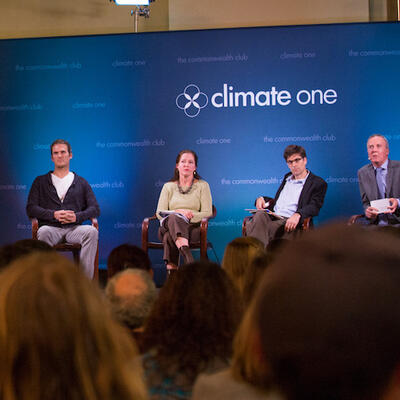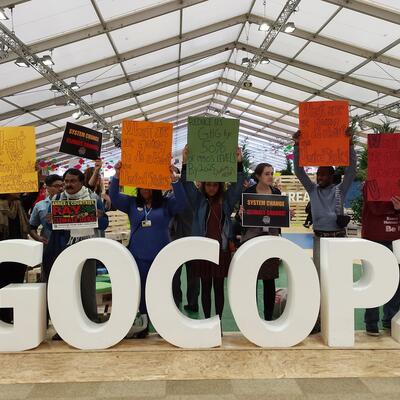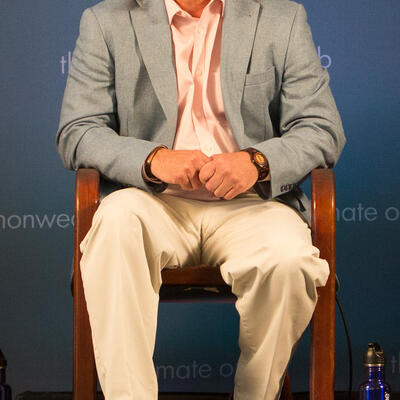
Rounding up the Facts on GMOs
Guests

Scott Kennedy

John Purcell
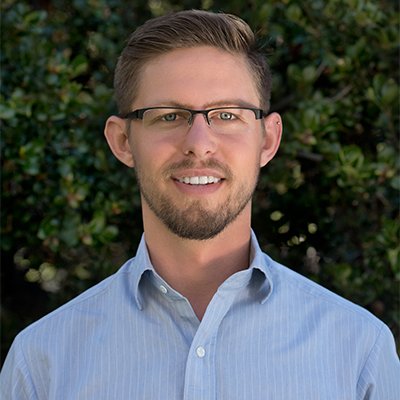
Austin Wilson
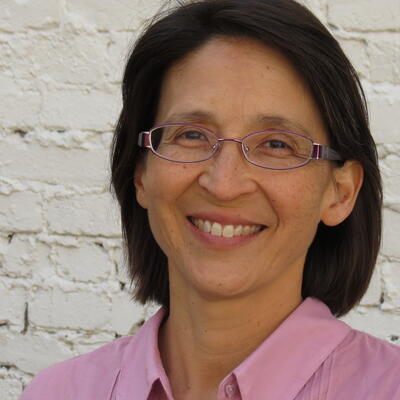
Marcia Ishii-Eiteman
Summary
Are GMOs the answer to our planet’s food shortage? Or are they jeopardizing our crops by creating a destructive cycle of Roundup resistance? Like many issues these days, it depends on who you listen to. Supporters of genetically modified organisms say that altering the DNA of corn and other crops is just another tool in the farmers’ toolbox. Opponents maintain that modified crops are dangerous because they promote high doses of glyphosate, which California has listed as a carcinogen.
Guests:
Scott Kennedy, Filmmaker, "Food Evolution"
John Purcell, VP and Global R&D Lead, Monsanto Company
Austin Wilson, Environmental Health Program Manager, As You Sow
Dr. Marcia Ishii-Eiteman, Senior Scientist, Director Grassroots Science Program, Pesticide Action Network
This program was recorded live at The Commonwealth Club in San Francisco on May 25, 2017.
Full Transcript
Announcer: This is Climate One, changing the conversation about energy, economy and the environment.
What’s the truth about genetically modified organisms, or GMOs? A safe and effective way to beef up our food supply, or a corporate profit-making scheme that weakens the health of our crops and hamstrings America’s farmers?
Like many issues these days, it depends on who you believe.
John Purcell: We’re about providing solutions for growers, whatever choice they make. It's about tools in the toolbox and GMOs is just one of those tools, pesticides is just one of those tools. And farmers should be given the choice to allow them to choose what tools they want to employ in their operations.
Marcia Ishii-Eiteman: The problem with our agricultural system in the U.S. is that they don't actually have choice anymore. They are stuck. They tell me if I want to buy non-GMO seeds, I can't find them because Monsanto has cornered the market.
Rounding up the facts on GMOs – up next on Climate One.
Announcer: Are GMOs the answer to our planet’s food shortage?
Welcome to Climate One – changing the conversation about America’s energy, economy and environment. Climate One conversations – with oil companies and environmentalists, Republicans and Democrats – are recorded before a live audience and hosted by Greg Dalton.
Opponents of GMO’s say that modified crops are dangerous to our health. They’re resistant to pesticides such as Monsanto’s Roundup, which has been linked to cancer. And that they’re jeopardizing our crops by creating a destructive cycle of Roundup resistance.
Supporters say that altering the DNA of corn and other crops is just another tool in the farmers’ toolbox - an innovation that will help feed a world whose food production has been disrupted by climate change.
Today on Climate One, Greg Dalton welcomes four guests. John Purcell is vice president of Monsanto vegetables and head of their global research and development. Marcia Ishii-Eiteman is a senior scientist with the Pesticide Action Network. She has worked with farmers in Asia and Africa on ecological pest management and sustainable agriculture. Scott Hamilton Kennedy is director of Food Evolution, a documentary on GMOs narrated by Neil deGrasse Tyson. And Austin Wilson is environmental health program manager with the shareholder advocacy group As You Sow. He’s the author of a new report: Roundup Revealed: Glyphosate in our Food System.
Here’s our discussion on rounding up the facts on GMOs.
[Applause]
Greg Dalton: John Purcell, let's begin with you. In the film Food Evolution, Neil deGrasse Tyson notes that Monsanto is one of the most hated companies in the world. Why do people have such strong feelings toward Monsanto?
John Purcell: I think maybe you need to ask people that. They’re expressing those views. But I think for me, I’ve been in Monsanto for 20 years now and I went there I was a bug guy studying insects in the graduate school. And I went there and what really struck me about Monsanto was the vision that agriculture was gonna change. But when you are a visionary, when you are trying to bring new technologies to the market, it's not always smooth. And I think for me though that vision that agriculture was gonna change and biology would be a huge driver of that, that's what got me and a lot of the biologists that came to Monsanto excited because we wanted to find new ways to help farmers and we wanted to do it in a sustainable fashion, and we want to make sure all the tools of modern biology are being used. And that’s still what attracts me today almost three decades later about Monsanto. It’s providing those tools to growers.
Greg Dalton: New innovation. Marcia, am I saying your last name correctly? Ishii-Eiteman.
Marcia Ishii-Eiteman: Correct.
Greg Dalton: Okay. So Marcia Ishii-Eiteman, what are your objections to GMOs? You worked in Africa and Asia. What are your objections to GMOs?
Marcia Ishii-Eiteman: Well, my central interest and as I spoke to you my reason for coming here to address the issue of climate change is for us as a society to identify the best ways for climate change as shown in your clip just now is real, it’s happening. We're looking at a potential 4 to 5-degree increase in global warming, in global weather and we need to act urgently now. So you’re asking about GMOs and we will certainly get into the, you know, ifs, ands and buts around the GMOs, but what I really want us all to understand is that we do need to act. Agriculture, including the use of GMOs in industrialized pesticide energy intensive farming has been a key contributor to the problem of global warming, contributing one-third, that’s one-third of global greenhouse gas emissions. This is a significant amount. It's very troubling and the data show that much of this is coming from chemical intensive monocultural industrial agriculture, the use of chemical fertilizers and so on.
But the good news is that agriculture also provides us with the solution. So we don't have to go down this path of continued environmentally devastating agriculture that is contributing to greenhouse gas emissions. We can turn the whole picture around and this can be done through agri-ecological farming and that is what is so exciting and I think we all need to really get behind. Because by starting with healthy soil, capturing atmospheric carbon and putting it in the soil, soil carbon sequestration, it's really very simple, getting carbon in the soil. And you can do this through ecological farming by having a diversified farming system, perennial plants, agroforestry, it needs, it must be diversified.
And then with a very diversified cropping system, you’ve got the soil capturing the carbon; we can see our way out of this. Ecological farming as opposed to the industrialized chemical intensive model is what climate scientists are now pointing towards as the best way forward for agriculture. And that's what's, you know, very, very exciting and I'd be happy and I will a little later give some examples of what that actually looks like for farmers in Iowa, in Minnesota, in California, in Mexico, in, you know, Tanzania, it’s happening all over the world and that's very promising for us.
Greg Dalton: John Purcell, how much of that do you agree with? Climate change is a big problem, agriculture is part of it, part the problem, part of the solution.
John Purcell: I agree with it. Actually, climate change is a big problem. I mean, I was at the march a few weeks ago with 50,000 fellow scientists, climate change is real. I mean, this is something we’ve got to deal with and we need solutions. And I think about the role of modern agriculture. I think about the reduction of pesticides we’ve seen with insect-protected crops. You think about herbicide-tolerant crops which allow for the adoption of conservation tillage. Conservation tillage, the carbon footprint on that allows you to do the equivalent of removing 10 million cars a year from the road because of the fact you are not tilling the soil.
So I don't think GMOs are inconsistent with that effect. For me as a biologist, that’s one of the drivers for me. That's one of the drivers for why we’re trying to find sustainable ways to grow it and carbon is part of the equation, energy is part of the equation. Corn today is produced on – you can produce more corn, a bushel of corn with less land, less water, less energy and with a more positive carbon footprint than you could 30 years ago. So we’re making tremendous progress and I think for farmers, sustainability is at the heart of what they do whether they be large growers or small growers. My brother is a small rancher in Montana. He thinks about that every day, about how do I make a more sustainable operation.
But large growers think the same way. That soil, that water, that environment, that’s their lifeblood. That's what they do. And modern tools are not incompatible with that, in fact they’re helping on that equation.
Greg Dalton: Austin Wilson, you authored a report on glyphosate which is the herbicide known as Roundup and a lot of that is applied to soybean, corn in the American Midwest. Your take on this in terms of GMOs and the pesticides used, part of the solution to climate change or part of the problem?
Austin Wilson: So half of American farmland is planted with just three crops, genetically engineered soybeans, corn and cotton. And that's reflective of the overall system where 99% of GMOs that are grown either produce insecticide, they’re embedded with Bt, bacterial insecticide, or they are tolerant to toxic herbicides like Roundup, dicamba and 2,4-D. 80% of global GMOs are applied with Roundup. And Roundup two years ago was classified by the World Health Organization's cancer authority, the world’s leading cancer authority, as a probable carcinogen. To the state of California, it is now labeled as a known carcinogen. There is extensive research on low-dose toxic effects even at the doses that are present in the food system. So these technologies have been used primarily as a pesticide delivery system. Monsanto and the other – there are six seeds and pesticide companies that control 90% of the world seed market and 80% of its pesticide market. And that is how this technology has been deployed. Right now over 90% of Monsanto's revenue is through Roundup and it's through genetically engineered crops and traits that are meant to be used with pesticides. Only 6% is the seed of the fruit and vegetable division. So that's the big challenge that this industry is facing.
The food industry right now is having a major challenge of grappling the sustainability, their customers want sustainable food, their investors want them to be ready for climate change and have resilient long-term sustainable systems. GMOs have been a barrier to that sustainability because they’ve been driving pesticide use.
Greg Dalton: Scott Kennedy, your film looks at this from both sides though; it's supported by food industry, food scientists. There is a piece in there that claims that the amount of fertilizer goes up but the toxicity is actually down. Tell us that piece.
Scott Kennedy: That's a good example. I’d love to take a step back and just say very clearly I don't work for Monsanto. Just what kind of position this is as being one side against another side and the film was produced independently. I had the final cut on the film and that's a very important part of this. And I want to – like things get conflated in this conversation so much, right, and we say that GMOs are this or GMOs are that. And I think that the conversation around food has really gotten out of balance. And a way that we can get some of that bounce back is saying yes and. And really looking at pieces individually, right. That's one of the reasons we wanted to make the film.
So what is a GMO, right? GMO is a process not a product. You guys are talking about a very specific product. You want to continue talking about that, we can talk about that, but let's not remove this piece of technology that can be used to say, save the bananas in Africa and has nothing to do with Monsanto. So just separate those two, thanks, and we can continue that as we go along today.
So glyphosate, Roundup. Did pounds of it increase as Roundup products came into market? Yes. So Chuck Benbrook had a study, that's on the front page. The thing that was left out and that became memes and was communicated all over the world, the thing that was left out is two pages later he also said that because of glyphosate's very low toxicity and low impact on the environment he doesn't see any increase in environmental impact.
So we leave that out of the conversation, bring that nuance into the conversation.
Greg Dalton: So Marcia Ishii-Eiteman, we have one string of thought here that glyphosate is a carcinogen. Another line of thought saying it's lower toxic, it has less toxic than other pesticides. Which is it?
Marcia Ishii-Eiteman: We can look to the world's premier health organization, the World Health Organization, its cancer research agency that has determined that Roundup is – that glyphosate is a probable carcinogen. That's enough to know. I think that for, I’m a mother and a scientist, a biologist, and I think it's a false choice to say well maybe it's only cancer and it’s not too toxic or, you know, it won't give you dizziness, but it might give you cancer or as industry representatives often say, well we brought in glyphosate so we can reduce other chemicals that cause birth defects and so on. That's an extremely offensive position to take to say, hi guys, you know, we’re giving you cancer instead of brain damage or birth defects, especially when we know that we don't need to do it this way. I was traveling across Minnesota and Iowa last fall, I visited an Iowa farmer. He has been a conventional corn and soybean farmer. He is seeing as many of his neighbors are that this is not working. There are super weeds. There are over 60 million acres of farmland in the U.S. that are resistant to glyphosate. And we now have monstrous weeds like big as baseball bats. This has been reported in the news over the past years that farmers simply cannot deal with. Their farms are being overrun. This is not an accident. This has occurred after 10, 20 years of massive use of Roundup.
We’re hearing from Austin about the use of Roundup. It has increased and this is USDA. U.S. Department of Agriculture data shows that the use of herbicides has skyrocketed over the past; you know, 15, 20 years since we have had these Roundup resistant crops. So we have over 500 million pounds of herbicides that are being used. And just to explain in case folks don’t yet know what herbicide-tolerant crops do, these are the crops designed by Monsanto, the Roundup ready corn, cotton and soybean. They have been engineered to tolerate large amounts of an herbicide. This is convenient because it's a proprietary herbicide which provides the biggest profits to the company. So that is the purpose for having Roundup resistant corn, cotton and soybean across the country. It's not about getting conservation tillage or being able to help farmers resist drought. That can all be done through ecological processes and through conventional breeding much more successfully.
Greg Dalton: John Purcell, your response.
John Purcell: I’ve got to address the carcinogen issue. Glyphosate is not a carcinogen. It has been assessed, reassessed, affirmed, reaffirmed by regulatory bodies around the world. There is not a single regulatory body that has come to the conclusion that glyphosate is a carcinogen. IARC is an outlier. IARC does not do –
Greg Dalton: IARC is the International Association for Research on Cancer.
John Purcell: Part of WHO. Other regions within WHO have come to the opposite conclusion. I encourage you to go look on the IARC website. Look what else is on that list. You know what else is listed with glyphosate as class 2A, hamburgers, steaks, anybody a hot mate drinker? Class 2A, same as glyphosate but only if you heat it and drink it. All right. Beer, wine, class 1. Anybody drive a diesel? Diesel exhaust. I mean, the list goes on. Working as a hairdresser, working in a barbershop, shiftwork. These are all on IARC list.
Greg Dalton: John Purcell is the vice president of Monsanto. Other guests today at Climate One is Scott Kennedy, director of the new film, Food Evolution; Austin Wilson, an advocate with As You Sow, a shareholder advocacy group; and Marcia Ishii-Eiteman is with the Pesticide Action Network. I'm Greg Dalton.
Gabe Brown is a farmer in North Dakota who says his crops and the health of his soil are doing better without glyphosate. Let's listen.
[Start Clip]
Gabe Brown: My name is Gabe Brown and I farm and ranch near Bismarck, North Dakota. We grow a wide variety of cash crops everything from corn, barley, peas, wheat, oats. The ranch has been in my wife's family since 1956 and my wife and I bought it from them in 1991.
When I originally started farming, I took over a farm that was very conventional; tillage with the use of fertilizers and herbicides and pesticides and fungicides. And as my knowledge progressed and I learned more about how soil functions, I learned that those things are detrimental to a healthy functioning ecosystem. So we quit using glyphosate five or six years ago now and we’ve noticed an improvement in the health of the plants because of that.
I can understand why producers use it because it's very easy, but the long-term health of their resource is being negatively affected by the use of glyphosate. Monsanto, they are like any other large agribusiness company. They’re profit-driven and in my mind they did not put the resource or human health first.
[End Clip]
Greg Dalton: That was North Dakota farmer Gabe Brown. So John Purcell, your response. Some farmers like it, obviously a lot of farmers are using it. There’s a farmer who said I don't need to use it anymore and the plants are healthier without it.
John Purcell: Yeah, this is about what are the tools you want to use. My dad was a carpenter. He said don't leave for a job unless you got right tools in the toolbox. GMOs are one tool. Pesticides are one tool. Think about biologicals, think about some of these. These are all tools in the toolbox. Growers are gonna choose different production methods. As a seed company, I want to provide seed to growers who want to grow GMOs, want to grow conventionally and want to grow organic. I'm in the vegetable business. You cannot be in the vegetable business unless you have products that actually will support almost $100 billion industry, organic market. We’re about providing solutions for growers, whatever choice they make. And that's what it's about. It's about tools in the toolbox and GMOs is just one of those tools, pesticides is just one of those tools. And farmers should be given the choice to allow them to choose what tools they want to employ in their operations.
Announcer: We’re talking about genetically modified food here at Climate One. You can listen to all of our programs and subscribe to our podcast at our website: climate-one-dot-org. We’ll continue the conversation right after this.
Announcer: This is Climate One. We’ve been talking about the pros and cons of GMOs, pesticides and other farming production methods.
Our guests today are John Purcell of Monsanto, Marcia Ishii-Eiteman of the Pesticide Action Network, documentary filmmaker Scott Hamilton Kennedy and Austin Wilson with the advocacy group As You Sow.
Let’s continue our discussion. Here’s your host, Greg Dalton.
Greg Dalton: Austin Wilson, your report talks about pre-harvest spraying of glyphosate. Tell us about that, what the concern is.
Austin Wilson: Right now for the company's business strategy and the other pesticide companies, there really has only been one tool and that tool has been herbicide use. One of the new ways in which Monsanto is encouraging farmers to use Roundup is to spray it on crops just before harvest so that when if the crop is drying somewhat unevenly that it dries evenly and harvest can begin earlier.
And this is something that is demonstrably raising the glyphosate residues in food to very high levels. It's something that has questionable benefits and with such a high potential risk. It's something that really is more deserving of scrutiny and has been flying under the radar until very recently. So that has been something that companies have been encouraging farmers to do on wheat, barley, edible beans and other crops.
But there's two really quick things that I need to point out that have come up in this conversation so far. One is that the World Health Organization doesn't reflect the conclusion that the EPA has come to about glyphosate. So let's talk about the EPA's pesticide office very quickly. The EPA's pesticide office uses nonpublic industry studies and they use outdated rules that discount the vast majority of peer-reviewed science. Because of that, EPA is not looking at the large quantity of academic science that the World Health Organization's cancer authority is looking at one of reviews of glyphosate. EPA's recent scientific advisory panel just concluded that EPA did not follow its own guidelines when it was assessing glyphosate's carcinogenicity last fall.
And EPA did consider Roundup and glyphosate to be carcinogenic back in the early 90s but changed its mind after intervention by the industry. So there is a long and deep history here that is really worth looking into.
Greg Dalton: Scott Kennedy, you were saying that there are different things, the EPA is looking at different studies, European agencies looking at different studies, different rules so they come to different conclusions.
Scott Kennedy: I think we all know that we’re living in a time of fragility around what is a fact and who to trust. And I'd like us to take a step back and there’s a lot of conflating going on. I thought there was gonna be a panel about GMOs; we’re talking a great deal about pesticides. Pesticides are different from GMOs.
But one of the questions I have for the two guests who are supposed to be on the other side, I'd like it to not be on the other side because I think we all want the same thing. I'm a father. I'd like safe and sustainable food for my children. But are you telling this audience that the same organizations that we listen to, to support the video at the top of the show telling us that we have climate change, those same organizations are telling us that GMOs – telling me as a parent, that GMOs are safe for my children and safe for the environment. We should be listening to you two over those same organizations that are telling us that climate change is good. I should be listening to you over Neil deGrasse Tyson and these other places.
That concerns me as a parent that you guys say some very powerful words but a lot of it seems like fearmongering to me. I'd like to get to some of those same conclusions. Are there too much toxicity in our farming systems? Let's have that conversation. But when you make it a blanket statement and you leave out the fact that some very profound scientific organizations go counter to what you're saying, I don’t want to get on that bus.
Greg Dalton: Marcia.
Marcia Ishii-Eiteman: Absolutely. This is the conversation we need to have.
Scott Kennedy: Okay.
Marcia Ishii-Eiteman: And first of all, there is too much toxicity in our farming system. That is why we have skyrocketing rates of childhood cancer in rural communities.
Scott Kennedy: Not science to support that. There’s not science to support that.
Marcia Ishii-Eiteman: There is a massive amount of scientific evidence supporting that.
You, Mr. Kennedy, you know, this film that you came up with it is an industry-funded propaganda item. It is funded by this Institute of Food Technologists which on its own website actually says yes we are here to support the food industry. Our goal is to have universal acceptance of science and innovation in food products.
Greg Dalton: Austin Wilson.
Austin Wilson: I also watched the film, just last night I finally got the screener and the film for the most part seems to focus almost exclusively on the safety of ingesting GMOs. We’ve been talking a lot about pesticides –
Scott Kennedy: It talks a lot about other uses of GMOs we really like to move on to.
Austin Wilson: And that’s why we’ve been talking about pesticides today because 99% of them are about insecticide and they’re about using more herbicide. That's why the conversation has gone in that direction.
Scott Kennedy: That’s like saying a car has emission so I shouldn’t use car.
Austin Wilson: We are talking about the GMO banana, right? You spent a lot of time talking with the GMO banana in the film. That banana, the researchers that are developing it, they said there’s no assurances that this is even going to work. Right now, the problem that that banana was developed to address is being addressed without genetic engineering technology. There are techniques involving cleaning equipment, debudding flowers in certain ways with certain community education centers. They are already tackling this problem.
And in general, speaking generally, we've seen the problems that GMOs were promised to tackle, already tackled by traditional breeding and at a much, much lower cost. And that's why the industry that's been creating genetically modified crops has been focused on using it as a mechanism for delivering pesticides.
Greg Dalton: John Purcell.
John Purcell: You totally missed the – I know you talked about where our priorities are. You've totally missed what we actually focus on. GMOs are one piece of the puzzle. We spend much more on breeding programs. We spend much more on molecular markers. We spend much more on tools that allow our breeders to make selections, to think about how nature is actually providing resistance. We spend much more on new tools. We have a group here at climate corps, some of the smartest people I've ever met thinking about digital tools that help bring it together. How do I use the seed? How do I use the new tools? How do I use biologicals? How do I think about climate? How do I think about disease pressures? We spend much more on all that than we do on GMO research.
GMOs are one tool. But really the outlook for the future of agriculture is about how do you put all those tools together. And that’s what’s missing in this conversation is the way you portray modern agriculture is literally what it was 20, 30 years ago. It's a very different world these days. It's about combining the best of what we’re learning in many different kinds of agronomic systems and then putting those tools to use in the grower and giving them the digital and the decision-making tools that allow them to do that effectively. That's what modern agriculture is about and that's where it’s heading in the next decades.
Greg Dalton: Let me ask Austin Wilson. Are you against GMOs anytime, anywhere?
Austin Wilson: No. Technology is not inherently good or bad. It's how we deploy it in the real world. And right now all these tools they sound like great beneficial tools and I'm glad that there are companies out there developing them.
Right now, the tool that has been dramatically overused is these pesticide dependent technologies. That's what most of the company's revenue comes from. And now we've planted so many Roundup ready crops across the country and across the world that there are super weeds resistant to glyphosate on half of U.S. farms. What the company's strategy now has been to develop new crops that are resistant to both glyphosate and dicamba. Dow Chemical is already selling crops that are resistant to glyphosate and 2,4-D. These are pesticides that are known to be more toxic and volatile. 2,4-D is a known carcinogen that is used in Agent Orange and we’re gonna be using more pesticides, 10 times more 2,4-D and dicamba than we are today by the company's own plans. That's not sustainable agriculture. Sustainable agriculture is about agroecology, integrated pest management and using pesticides as little as possible.
Greg Dalton: And possibly using GMOs.
Marcia Ishii-Eiteman: Let’s talk about these tools in the toolbox point that you have shared with us.
John Purcell: Yeah, absolutely. I’d love to talk about that.
Marcia Ishii-Eiteman: So and yeah, and you talked about farmers needing choice and I absolutely agree that farmers should have choice. The problem with our agricultural system in the U.S. and this – many farmers in the Midwest have told me this – is that they don't actually have choice anymore. They are stuck, caught up in this massive system, this Roundup ready, this glyphosate dependent system of corn and soybeans in the south of cotton. They tell me if I want to buy non-GMO seeds, I can't find them because Monsanto has cornered the market. I go into my seed store and all I can find are Roundup resistant seeds. If I were to go out of my way and try to track down some non-GMO corn and plant it, they tell me I am at risk of drift from all my neighboring farmers who are spraying Roundup drifting onto my conventional normal healthy corn and that corn being destroyed by the Roundup.
Now this issue of pesticide drift has become even more severe. We were hearing from Austin that because of the resistance growing to Roundup which I mentioned earlier, the chemical companies, and the chemical and biotech companies are one and the same. They’ve like Dow has come up with corn, cotton and soybean that is resistant to glyphosate, keep those sales going and 2,4-D which Dow produces. 2,4-D you may remember that from the Vietnam War from Agent Orange. 2,4-D is linked to birth defects, to neurological damage, to cancer as well. 2,4-D and dicamba the other herbicide that is now being introduced into the whole GE herbicide promoting system, dicamba also is linked to cancer. These two herbicides are extremely volatile and what that means is when they are sprayed throughout the season, warm weather, they volatilize, they turn into gas, they drift for miles and miles. And they are not only harmful to human health, but they are extremely toxic to all broadleaf plants like basically all these other plants.
So we are already seeing farmers, conventional farmers, vegetable growers having their crops damaged by the products that the chemical companies are producing. We had a case in the South between a farmer and another one whose dicamba drifted that led to actual serious violent altercation resulting in death. This is what is happening. The fabric of the world communities is being torn apart. Farmers do not actually have the choice that they want to have to be able to get out of this system that they’ve been locked into. Farmers tell me –
Greg Dalton: Let’s hear it from one of those farmers.
Marcia Ishii-Eiteman: You know they look 360° around them, it’s around cornfields, they want to get out of the system. They feel they are caught between a hard place. They say we’ve soiled our nests. We know our water is too polluted. We can't let our kids go swimming in the streams. There are examples like Gabe Brown who are –
John Purcell: Okay, Marcia. I’ve been on farmers’ fields, I know farmers’ fields in 36 countries and I can tell you they have choice. For the statistics on the seed, if you look at the volume of global seed only 40% of that actually comes to commercial venues, and then of course look at the companies within that that’s a subset of that 40%. So there's lots of choices out there. Farmers make that choice whether they go GMO, whether they go organic, whether they go conventional, whether they go biotech. Farmers are making choices every day on seed.
Greg Dalton: I’m Greg Dalton. We’re talking with John Purcell from Monsanto, Marcia Ishii-Eiteman from the Pesticide Action Network, Austin Wilson an advocate from As You Sow advocacy group, and Scott Kennedy director of the new film Food Evolution.
I want to go to our lightning round. We’re gonna ask a series of brief questions to our guests. I’m gonna a noun and they’re gonna tell us the first thing that comes to their mind, unfiltered. Starting with Scott Kennedy, organic apples.
Scott Kennedy: Copper sulfate.
[Laughter]
Greg Dalton: John Purcell, organic strawberries.
John Purcell: Go for it. It’s a market.
Greg Dalton: Austin Wilson, the food journalist Michael Pollan who’s in the film, Food Evolution.
Austin Wilson: Out of context.
[Laughter]
Scott Kennedy: That’s good. That was good. That was good.
Greg Dalton: Marcia Ishii-Eiteman, food expert Marion Nestle.
Marcia Ishii-Eiteman: An excellent, like many of us, person investigating, considering different sides of the story.
Greg Dalton: Scott Kennedy, EPA administrator Scott Pruitt.
Scott Kennedy: I don't know him.
[Laughter]
Greg Dalton: True or false. John Purcell, eating hotdogs and other processed meat increases cancer risk according to the World Health Organization.
John Purcell: According to IARC.
Greg Dalton: Which is a part of the World Health Organization. It says increase –
John Purcell: And I’m a hotdog, Spam guy so I'm not the guy to ask probably so.
Greg Dalton: Scott Kennedy, while making Food Evolution you communicated with representatives of companies that sell GMO food and pesticides.
Scott Kennedy: Yes.
Greg Dalton: Marcia Ishii-Eiteman, Bill Nye the Science Guy changed his mind on GMOs and now supports them after spending time with Monsanto scientists.
Marcia Ishii-Eiteman: That's what the power of a strong PR firm will do.
Greg Dalton: That’s a yes.
John Purcell: Or the power of scientists.
Greg Dalton: Austin Wilson, glyphosate is not likely to get into groundwater because it binds tightly to soil.
Austin Wilson: USGS scientists say that we know very little about glyphosate’s long-term impacts on the environment.
Greg Dalton: The National Pesticide Information Center and Oregon State University and the U.S. EPA says that it does bind to soil and unlikely to get into groundwater. Austin Wilson, you may have already addressed this, yes or no, you oppose GMO food anytime, anywhere for any reason.
Austin Wilson: Technology is not inherently good or bad, it’s about how it's used.
Greg Dalton: Marcia Ishii-Eiteman, true or false. Most people who oppose GMOs have not looked closely at the science around GMOs and glyphosate.
Marcia Ishii-Eiteman: That's why it's very important to provide really strong evidence-based information. I think most people who oppose GMOs are concerned. They want answers to questions and our scientific agencies have not provided the answer that people have a right to know. I think we all have a right to know what’s in our food and how it is produced.
[Applause]
Greg Dalton: Absolutely. True or false. Marcia Ishii-Eiteman, you would eat GMO corn on the cob.
Marcia Ishii-Eiteman: If I was at the ballpark and I decided to, you know, buy some I would GMO corn on the cob. I would much prefer to go home and go to a farmers market and buy organic corn from –
Greg Dalton: So you would, that’s a yes.
[Laughter]
Marcia Ishii-Eiteman: –you know, a farmer who is doing his best or her best to provide a healthy future for all of us and a clean environment for the next generations.
Greg Dalton: Austin Wilson, yes or no. You would eat GMO salmon.
Austin Wilson: Sure, but I worry about its long-term impacts through contamination.
Greg Dalton: All right. That ends our lightning round. Let’s give them a round for getting through that.
[Applause]
Scott Kennedy, you think organics are oversold, why?
Scott Kennedy: Thank you for asking me that. Yeah, a Woody Allen joke comes to mind when I think about these conversations we’re having when he's trying to talk up this girl and he lowers her to a Jewish liberal cliché of the Upper West Side and trying to correct himself he goes, yes I'm, I'm a bigot but, but for the left. And in this conversation it feels like sometimes people are talking about this that, you know, organic is a miracle and it’s gonna save my children, save the planet, and GMOs are poison. And it's sort of like, yeah I'm a hypocrite, but for the left. And it's a shame because we want so many of the same things, right? So this is not an either or. GMOs were considered to be part of organic certification in the beginning and some people fought against that. We can grow GMO seeds organically. So back to your question about organics. So organic farming, I don’t have a problem with organic farming. It can be delicious. It's taught us a lot about the inputs that we put into our system. But I do have a problem with somebody telling me that I'm not a good father or I'm putting my kids at risk if I'm not buying organic food. There's no science to support that. And my question to the audience is, which is more important for our kids, that they eat organic vegetables or they eat fruits and vegetables? And we know the answer is to eat fruits and vegetables and how hard that is.
Greg Dalton: Marcia Ishii-Eiteman, we had a farmer on this stage last night who is a grower in California, he grows organic. He uses a little bit of GMO. What's wrong with a little bit of both? We’re so polarized in this country that all GMOs are bad, they’re the devil, organics are the heroes. Is there any grey middle ground that you can see?
Marcia Ishii-Eiteman: I think we need to – that’s an important question and we need to look at the opportunity costs in our agricultural system when so much of our research money, so much of our agency support is going towards this one model of pesticide intensive GMO production.
We have a fraction of a percent that is going, you know, in our USDA research money that is going to ecological farming, which we have seen from Gabe Brown which I have seen from traveling around the country and around the world is the most robust vigorous way that we can nourish the world, address climate change, enable farmers to have healthy, resilient food systems. So it’s a matter of priority. There’s also a problem –
Greg Dalton: Let me ask John Purcell, would Monsanto support more R&D, more funding for organics?
John Purcell: We support organic growth. I’ve got a lot of organic customers. I think the problem is we become so binary. This is right, this is wrong, this is good or bad. My brother’s ranch is small local, people come and it’s wonderful. It’s small, it’s local, it’s family-owned but he's a pork guy, small local pork. He's not putting pork chops in grocery stores around the country. You need both. We need all kinds of agriculture.
We support organic growers. Some of our varieties are organic. It works great because we have more resistance built into the varieties. They don't have some of the tools, they use pesticides, organic pesticides but they don’t have all the tools, conventional growers. So having that resistance in the seed is actually a good thing for organic growers. So absolutely we try to support the organic market.
Announcer: You’re listening to Climate One. We’ll be back in just a moment with more of our discussion on GMOs, and some questions from our live audience.
Announcer: This is Climate One, changing the conversation about America’s energy, economy and environment. To hear all our Climate One conversations, subscribe to our podcast at our website: climate-one.org, where you’ll also find photos, video clips and more. Please leave a comment. We’d love to know what you think about our conversations on energy, food, water, technology, psychology and more.
Today, we’re talking about genetically modified foods. Our guests are Marcia Ishii-Eiteman of the Pesticide Action Network, documentary filmmaker Scott Hamilton Kennedy, Austin Wilson with the advocacy group As You Sow and John Purcell, vice president of Monsanto Vegetables. Your host is Greg Dalton.
Let’s hear some questions from our live audience.
Female Participant: Hi. My name is Ellie Harnes [ph] and this panel is rounding up the facts on GMOs, right? So to me facts are based on peer review, literature and scientific evidence. So why not invite an independent scientist to participate in this panel because it's not exactly as if there is a shortage of reputable universities in this area or people to reach out to because it just seems as though the way this panel is structured is falsely balanced.
Greg Dalton: We have invited some other, not everyone you see up here, we did invite some people who were unable to join us. That's a good question. And I guess to the question I’ll ask Marcia Ishii-Eiteman of who is independent because there are organic-funded researchers and there's industry-funded, there's a big organic now and is there such a thing as an independent researcher when money comes from either government or corporations or Bill & Melinda Gates foundation which supports GMOs.
Marcia Ishii-Eiteman: I think what we’re really calling for is science that is dedicated to the public interest, not to corporate profits. So if a scientist is doing work that is going to ensure a healthy, ecologically resilient, you know, food and farming systems with clean air, clean water, you know, healthy soil, that is the kind of science that we need that is dedicated to the public interest, to the well-being of future generations.
Greg Dalton: So I would like to thank that questioner for actually pointing out we may have fallen into this binary trap in constructing this. We have two people in each side, where is the middle, where is that independent middle. Thank you for that point taken. Next question.
Male Participant: My name is John White. I'm not a scientist or a farmer. I'm interested in the potential economic damage and consequences that GMOs bring. Farmers required to purchase seeds every year rather than propagate their own seeds. I don't know if this is linked to the massive suicides in India of small farmers. I would like that question to be addressed.
Greg Dalton: Who’d like that. John Purcell.
John Purcell: Actually, it’s not. I mean, very reputable groups have looked at farmer suicides in India. The rate – it's a tragedy, it's a horrible tragedy due to economics and debt and other things, but the rate prior to the adoption of GMOs and after hasn’t changed. There is no causative factor with GMOs. That is a very common myth. And on the economic side, that's why growers choose to grow GMOs because it makes sense for them economically. Any definition of sustainability needs to include economic sustainability. And that means at the grower and farmer level as well. They need to stay in business and they make the choice to grow GMO or maybe grow organic or maybe grow non-GMO conventional. But that’s choices they’re making based on what their farm needs and what their actual market considerations are.
Greg Dalton: Marcia Ishii-Eiteman.
Marcia Ishii-Eiteman: I’ll speak to that as well that the economic point is a really important one. We have seen in the U.S. an attrition of family farmers who are going out of business every year and that is because they had bought into or had been trapped in this monoculture of Monsanto's Roundup-ready corn and soybean where the price of the seed has been skyrocketing. And the price of the seed has been skyrocketing because Monsanto is adding in all these genetically engineered traits. And for every trait there is another licensing fee. So now they have multi-stacked traits that have many of these genetically engineered patented traits.
And so the price of the corn seed has been going up and up, you know, it’s like over a hundred dollars a bag for corn. It’s through the roof and farmers are not able to recoup the costs of these expensive seeds and the pesticides that go with them. Monsanto's plan and this is their business plan which I need to emphasize is different than a sustainable livelihood plan for farmers. Their plan is that by 2050, they’re going to be bringing out seeds with over a dozen traits, they’re all packed in there.
Farmers do not get to choose which trait they want. They go to the store, they used to go to the store and there are 200 different seed companies and they could choose, this one works well in my area of Iowa, this one works well elsewhere, I've got low land, it's wet. Now all they have are the Monsanto products that are packed with traits and they have to pay these expensive licensing fees. So that is a big part of why family farmers are going out of business in the Midwest.
Greg Dalton: Let’s go to our next audience question. Yes, welcome.
Male Participant: Hi. I learned about glyphosate a while ago when I went to this food as medicine course and it was held by the Center for Mind-Body Medicine and it had peer-reviewed cutting-edge research done on the effect of glyphosate on your system in the short term. We’ve talked about maybe being a carcinogen in the long-term, but in the short term there's also a pretty important effect that it seems to have on humans and that it acts like an antibiotic and messes with your microbiome. The microbiome is where a lot of neurotransmitters like serotonin, dopamine, your everyday well-being is affected by the chemical.
Greg Dalton: John Purcell.
John Purcell: And again this is what regulators do. They look at the risk profile of a molecule and say does it produce undue risk to the population, to the environment, et cetera. And when they assess it, the safety record of glyphosate is clear. 40 years of use and been confirmed and reaffirmed over and over again by regulatory bodies. And you can cherry pick study here or there, whatever, but the science has to lead you and that's what regulators do.
Greg Dalton: We should also mention – hold on. John Purcell, we should also mention that there is 40 Californians who filed the suit, a class-action suit, claiming wrongful death and personal injury for getting non-Hodgkin's lymphoma. There is supposedly 700 other claims in state and federal courts. So that's in the court.
John Purcell: I had lost my dad to cancer. He had lymphoma actually. And it's a terrible disease. Everyone has personal stories about cancer. I feel for the people but glyphosate is not a carcinogen. Flat out.
Greg Dalton: Let’s go to our next question. Welcome.
Female Participant: I’m Mayta Chandra. My question is about super weeds and increasing herbicide resistance not just in super weeds but also in crops. So what’s the solution for that? Just adding more and more and more of herbicides? But what is the solution that you guys are coming up with in the industrial ag system for that.
Greg Dalton: John Purcell.
John Purcell: The industrial ag. I tell you what farmers do. I mean, farmers have always had challenge with weeds. Weed resistance has been an issue before and after GMO crops, right? And I think what they do is, yeah you look for alternative modes of action. That's what chemical mixtures do. And that's the strategy that the people are using. There's also other strategies around, how you think about weed control in the general side, rotations and other things you do. But I think the key is for any of it, you take an integrated approach whether it be for insects or diseases, et cetera. But yeah, alternative chemical modes of action are one of the strategies you take because the chances of getting resistance to growth are obviously much higher than resistance to single molecule.
Greg Dalton: Austin Wilson.
Austin Wilson: One of the big risks facing the food industry right now in their pursuit of sustainability is, of course, that the Roundup ready system is the dominant mode of agriculture across the U.S. and it is being replaced now with crops that are gonna be used with dicamba and 2,4-D.
So that's a huge risk and it’s I think the biggest risk here at the heart of the issue that we've been talking about today. And to look at the other side of that, Marcia has talked a lot about pesticide-dependent agriculture in general, and there's a recent report from the United Nations food experts at the Food and Agriculture Organization and they write that it's a myth that pesticides are necessary to feed the world. This has been written about by other Nobel prize-winning economists and agronomists and others for the last 40 years and they also criticize the pesticide industry for systematic denial of harms and unethical marketing tactics.
So as the system becomes more and more dependent on pesticides, as the Roundup ready system gets replaced by other herbicides we have to keep asking those questions because right now sustainability is in demand. Investors want companies that are prepared for the long run. And these are the questions we have to grapple with.
Greg Dalton: Austin Wilson is a with the advocacy group As You Sow. We’re talking about GMOs and glyphosate at Climate One from the Commonwealth Club. I'm Greg Dalton. Let's go to our next question.
Male Participant: Yes, hi. I am Marc Shapiro. I'm a journalist and actually writing a book on seeds. One of the fundamental challenges according to the climate science where the discussion begins is really about the enormous amount of volatility in the conditions for growing food, enormous volatility everywhere you look. So I guess the question is in the face of enormous shifts and pretty much reliably unpredictable shifts in the weather, how does a company, for example, like Monsanto which is extremely sophisticated in coming up with very specific traits, I think it's clear, deal with a situation that is so enormously volatile where you might have of a drought for five years and then suddenly you got like a very wet season.
Greg Dalton: Thanks, Marc. In fact, Monsanto bought the Climate Corporation –
John Purcell: It’s right here in San Francisco. That’s what they do. I mean, so that I can say some of the smartest people I’ve met in my life and they're trying to figure out how do you manage all these different tools. How do you allow a grower to make the dozens of decisions they make every day about fertilizer, about pesticides, about climactic additions, how they can impact their yield, how do they manage their crop. That's the future of agriculture and that's what the Climate Corp does and it's really exciting stuff.
Greg Dalton: John Purcell is the vice president of Monsanto. Marcia Ishii-Eiteman, let me ask you. We’re both very concerned about climate change. Climate change is a sort of I believe you can’t take anything off the table, nuclear power, whatever, can you see climate getting so disrupting of the world food system that some GMOs whether they’re drought tolerant crops, whatever, are necessary to feed a hungry and hot world.
Marcia Ishii-Eiteman: GMOs are not going to feed a hungry or hot world. And I think it's telling that just now Mr. Purcell mentioned the question of whether or how to allow farmers to do these things. Farmers have incredible depths of knowledge from all around the world, there’s indigenous and local knowledge and that is where our greatest resource is. What we need and the biggest scientific question is not how are we gonna get a gene for drought resistance into a plant, because drought tolerance is a very complex issue. It is not regulated or it is not controlled by a single gene as the questioner just mentioned, we have changing conditions. And what the data show, what the empirical evidence from all over the world shows is that farmers who are practicing bio-diversified, very ecological methods of agriculture have this resilience, this diversity in their system.
We have the example from when hurricane Mitch wiped out, you know, went across Central America and was devastating to farmers in Guatemala, Honduras and Nicaragua. The farmers that suffered the most were those who are in conventional systems, just planting corn, a single variety, their corn washed down the hillsides, lost a lot of soil, incredible damage, great economic loss. The farmers who survived and this is really important for going forward, the farmers who survived were those who had done contour farming or inter-planting maize and beans and squash, had different root systems reaching into the soil at different levels. They lost some crops, but they had other crops that survived and they were far better off, had way less loss to erosion, were economically much more productive such that after this devastating hurricane, many of the conventional farmers turned to the ecological farmers to say, how are you doing that. And that's exactly what we need going forward.
Greg Dalton: We have to wrap it up. Our apologies to people we didn't get to your questions. We've been talking a lively debate about GMOs, Monsanto's Roundup and the food you put on your kitchen table. Our guests have been Dr. John Purcell, vice president and Global Research and Development Lead at Monsanto vegetables; Scott Hamilton Kennedy, director of the new documentary Food Evolution which was funded by food technologists; Dr. Marcia Ishii-Eiteman, a senior scientist at the Pesticide Action Network; and Austin Wilson, environmental health program manager with the shareholder advocacy group As You Sow. He is the author of a new report, Roundup Revealed the Glyphosate in our Food System. I'm Greg Dalton. Thanks for joining us. We will see you next time everybody.
[Applause]
[End]
